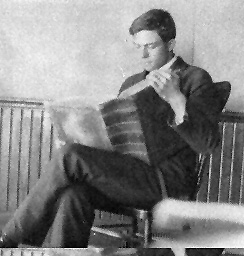Milton H. Erickson
Milton Hyland Erickson (5 December 1901 – 25 March 1980) was an American psychiatrist and psychologist specializing in medical hypnosis and family therapy. He is noted for his approach to the unconscious mind as creative and solution-generating. Erickson is also famous for his influence on NLP (Neuro-Linguistic Programming), a method of psychotherapy and communication.
Early Life[edit | edit source]
Milton H. Erickson was born in Aurum, Nevada. At the age of 17, he contracted polio, leading to a critical phase where his survival was uncertain. During this time, Erickson became intensely aware of the significance of non-verbal communication and body language, observations that would later influence his therapeutic techniques. Despite his physical limitations, he was determined to overcome the challenges posed by polio, which he did through self-hypnosis.
Career[edit | edit source]
Erickson pursued his education in medicine and psychology, receiving his MD from the University of Wisconsin in 1928 and later engaging in psychiatric work. Over his career, Erickson developed a distinctive approach to psychotherapy and hypnotherapy, emphasizing the importance of the therapeutic relationship and the use of an individual's own experiential learning processes.
Erickson's methods were characterized by his innovative use of language and storytelling, often involving indirect suggestions and therapeutic metaphors. This approach contrasted with the direct suggestion methods prevalent in hypnosis at the time. He believed in the unique potential of every individual and tailored his therapeutic interventions to the specific needs of each client.
Influence and Legacy[edit | edit source]
Milton H. Erickson's work has had a profound impact on various fields of psychotherapy, especially in the development of NLP (Neuro-Linguistic Programming), brief therapy, and family systems therapy. His techniques have been incorporated into a wide range of therapeutic practices and are taught in many psychotherapy training programs worldwide.
Erickson founded the American Society for Clinical Hypnosis and was a frequent contributor to various journals and publications on the subject of hypnotherapy. His innovative methods and theories continue to be studied and applied in the field of psychotherapy.
Selected Works[edit | edit source]
Erickson's contributions to the field of psychotherapy include numerous articles, case studies, and books. Some of his notable works include:
- Hypnotic Realities
- My Voice Will Go with You: The Teaching Tales of Milton H. Erickson
- The February Man: Evolving Consciousness and Identity in Hypnotherapy
Death and Legacy[edit | edit source]
Milton H. Erickson passed away on 25 March 1980. His legacy lives on through the Milton H. Erickson Foundation, an organization dedicated to promoting his work and teachings. Erickson's innovative approaches to hypnotherapy and psychotherapy have left a lasting mark on the field, influencing countless therapists and the development of therapeutic techniques.
This article is a psychology-related stub. You can help WikiMD by expanding it!
Search WikiMD
Ad.Tired of being Overweight? Try W8MD's physician weight loss program.
Semaglutide (Ozempic / Wegovy and Tirzepatide (Mounjaro / Zepbound) available.
Advertise on WikiMD
|
WikiMD's Wellness Encyclopedia |
| Let Food Be Thy Medicine Medicine Thy Food - Hippocrates |
Translate this page: - East Asian
中文,
日本,
한국어,
South Asian
हिन्दी,
தமிழ்,
తెలుగు,
Urdu,
ಕನ್ನಡ,
Southeast Asian
Indonesian,
Vietnamese,
Thai,
မြန်မာဘာသာ,
বাংলা
European
español,
Deutsch,
français,
Greek,
português do Brasil,
polski,
română,
русский,
Nederlands,
norsk,
svenska,
suomi,
Italian
Middle Eastern & African
عربى,
Turkish,
Persian,
Hebrew,
Afrikaans,
isiZulu,
Kiswahili,
Other
Bulgarian,
Hungarian,
Czech,
Swedish,
മലയാളം,
मराठी,
ਪੰਜਾਬੀ,
ગુજરાતી,
Portuguese,
Ukrainian
Medical Disclaimer: WikiMD is not a substitute for professional medical advice. The information on WikiMD is provided as an information resource only, may be incorrect, outdated or misleading, and is not to be used or relied on for any diagnostic or treatment purposes. Please consult your health care provider before making any healthcare decisions or for guidance about a specific medical condition. WikiMD expressly disclaims responsibility, and shall have no liability, for any damages, loss, injury, or liability whatsoever suffered as a result of your reliance on the information contained in this site. By visiting this site you agree to the foregoing terms and conditions, which may from time to time be changed or supplemented by WikiMD. If you do not agree to the foregoing terms and conditions, you should not enter or use this site. See full disclaimer.
Credits:Most images are courtesy of Wikimedia commons, and templates, categories Wikipedia, licensed under CC BY SA or similar.
Contributors: Prab R. Tumpati, MD

